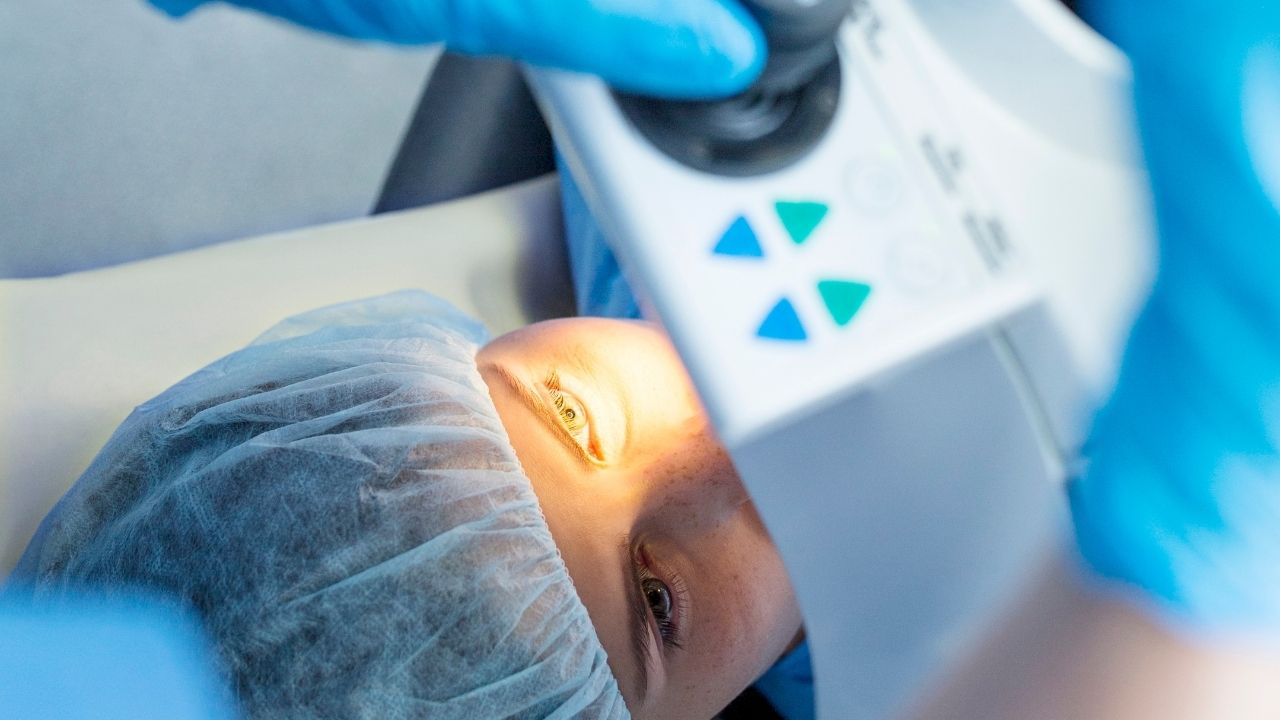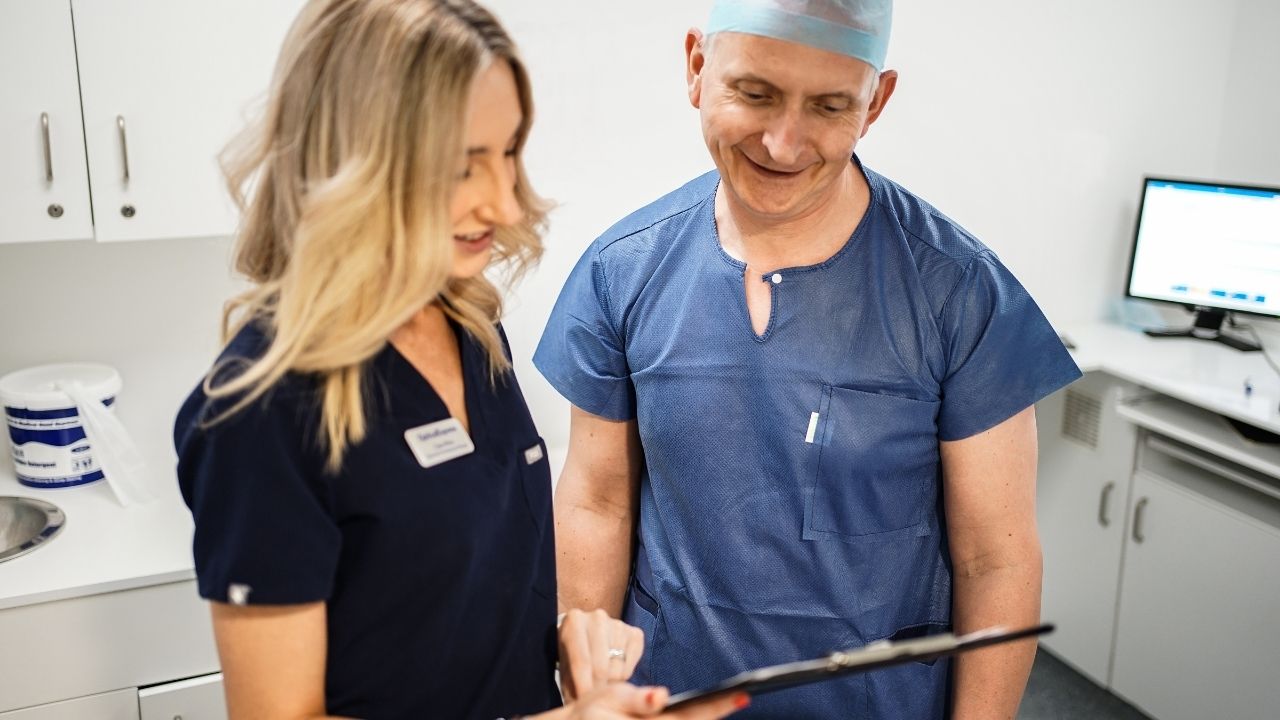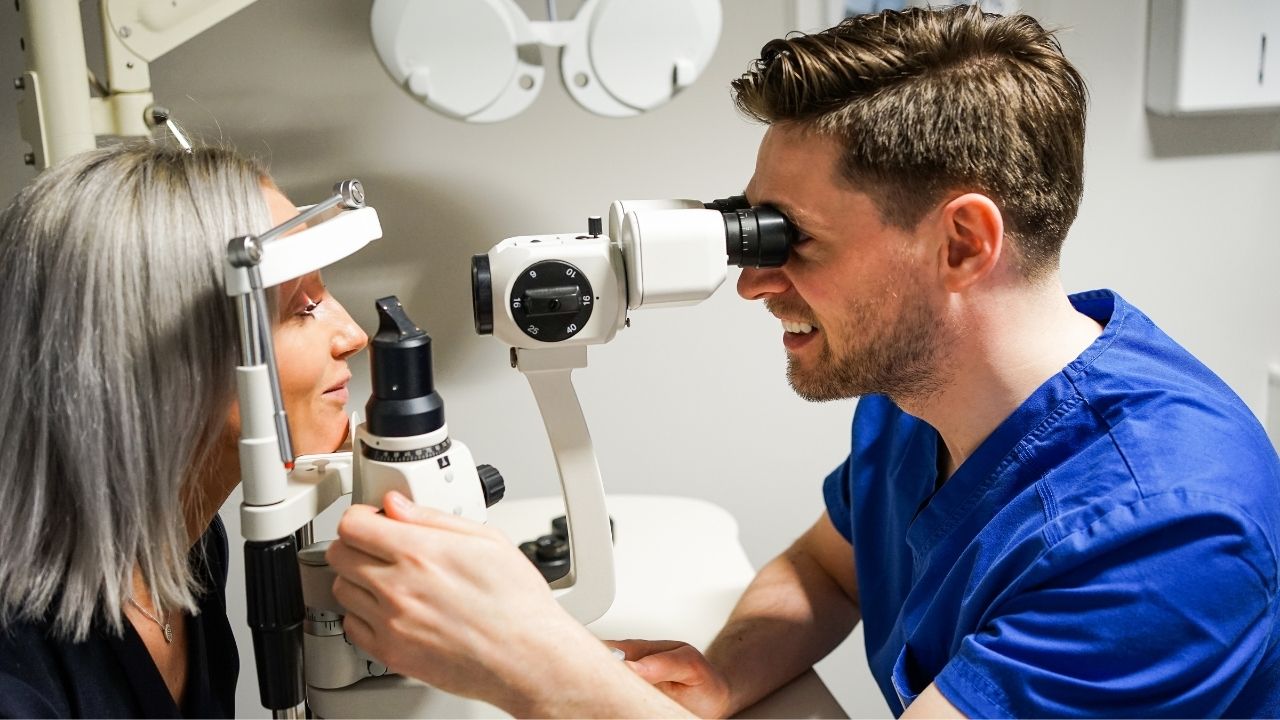Does laser eye surgery hurt? Here’s what happened to me


Parenting advice, hot topics, best buys and family finance tips delivered straight to your inbox.
You are now subscribed
Your newsletter sign-up was successful
If you’re considering laser eye surgery, you may have wondered, “Does laser eye surgery hurt?” Our writer Emma North shares her first-hand experience of this life-changing surgery - including how she felt during each step and how much recovery time was needed.
Thinking about laser eye surgery? Your first question is probably going to be whether it's painful or not. According to Clinical Services Director for Optical Express, Stephen Hannan, "It is normal for the eyes to feel uncomfortable and watery for the first 12 - 24 hours after." But, after undergoing this transformative surgery I can assure you it's not painful (just a little bit stingy!)
Laser eye surgery put simply, is the reshaping of the surface of the eye in order to correct vision concerns such as longsightedness, shortsightedness and astigmatism. The procedure was first carried out in Berlin in 1987, where Dr Steven Trokel performed photorefractive keratectomy (often abbreviated to PRK) and since then, laser eye surgery has seen huge advancements in technology. The two most popular types of laser eye surgery today are called LASIK and LASEK but, which procedure you have will depend on your suitability.
The demand for laser eye surgery is surging due to its high success rates (over 99% of Optical Express's patients achieve 20/20 vision or better) and according to this study, the market is set to grow by over $774 million from 2021-2025.
As someone who struggled with shortsightedness for years and was constantly wearing smudged glasses or poking myself in the eye trying to get my contact lenses in, laser eye surgery sounded like the procedure that could solve all my problems. So, I went to one of the world’s leading providers of laser eye surgery, Optical Express, to undergo LASIK laser eye surgery with iDesign.
Does laser eye surgery hurt?
It might sound painful but no, laser eye surgery does not hurt - although, there may be some discomfort after the procedure. “Due to the anaesthetic drops which are applied before the procedure, laser eye surgery itself is generally pain-free, but following the treatment, patients may feel some discomfort in the early stages of healing,” says Stephen Hannan.
Before undergoing laser eye surgery, anaesthetic eye drops are applied to the eyes, numbing the eyes and eyelids. This means that the speculum to hold open the eyelids during surgery and the laser itself, won’t cause any pain. Stephen explains, "The anaesthetic drops that are applied to the eye before surgery are used to ensure comfort throughout the process, so thanks to the numbing effect caused by the drops, patients will be unable to feel anything actually touching their eye during the procedure."
Parenting advice, hot topics, best buys and family finance tips delivered straight to your inbox.
Once your anaesthetic eye drops wear off (usually after a couple of hours) there can be a stinging or burning sensation. But, this should subside with a good night’s sleep. The next day, your eyes may feel a little dry and tender but following your aftercare advice will keep this discomfort to a minimum.

What happened when I had laser eye surgery
After visiting the London’s Harley Street branch of Optical Express to check if I was a suitable candidate for laser eye surgery, I then had several eye tests to get my ultra-accurate prescription and book my surgery date. My surgery was performed by renowned Ophthalmic Surgeon Dr Ghabra and I could not speak more highly of him.
The laser eye surgery I opted for was LASIK with iDesign technology. iDesign technology creates a 3D "map" of your eye and is 25x more accurate than standard sight measurements for glasses or contact lenses. This is an optional extra though and can be more costly.
Walking into the clinic felt nerve-wracking, but the friendly staff were so welcoming and assured me that everything was going to be fine with regards to my surgery. I underwent my vision tests again and I was prepped for surgery. Here’s what happened next…
http://www.youtube.com/watch?v=6sdS-Iq36Eg
Step 1 - Numbing and opening the eyelids
Before starting treatment, anaesthetic drops were applied to numb my eyes and eyelids. Dr Ghabra then placed a special instrument on one of my eyes, called a speculum, to hold the eyelids open. (This ensures you’re not able to blink during the procedure.)
Level of discomfort: 2/10 - Although it feels a little strange to have your eyes held open, this process isn't painful. The eyedrops do such a great job of numbing your eyes that the oddest experience is having the natural impulse to blink but not being able to!
Step 2 - Making the cornea flap
As I was having the LASIK procedure, a laser was used to create a thin, protective flap on the surface of one of my eyes. This flap is actually the outer window of the eye, called the cornea. Dr Ghabra then carefully lifted this flap to reveal the inner layers of my cornea. (The LASEK procedure differs here as it uses a diluted alcohol solution to loosen the outer layer of the cells which are moved to one side.)
Level of discomfort: 3/10 - You cannot feel anything while the laser gets to work creating the flap, the only slight discomfort will be from the speculum holding the lids open. This part can be a little unnerving though as once the flap is lifted, your vision temporarily disappears (your surgeon will warn you that this is totally normal and part of the procedure!)
Step 3 - The corrective laser
Following this, another laser called an excimer laser, was then applied. Working in a matter of seconds (I had 15 seconds of laser in each eye) and sending tiny pulses of cool laser beams onto the cornea to reshape imperfections, my vision was corrected.
Level of discomfort: 2/10 - I had just 15 seconds of excimer laser in each eye and there was no pain whatsoever. (Depending on the complexity of your prescription, the laser can be any time from just a few seconds to 2 minutes.)
Step 4 - Everything is put back into place
Once the laser was finished, the protective flap of my cornea was folded back by Dr Ghabra before moving onto the next eye. This flap can heal in hours to a few days so be careful not to rub your eyes and disturb its healing process. (For patients who undergo LASEK laser eye surgery, the surgeon may decide to reposition the outer layer of the cornea back into place and apply a protective contact lens on top, which will then be removed by the surgeon or an optometrist a few days after surgery.)
Level of discomfort: 3/10 - As the surgeon places the flap back into place your vision comes back, although a little blurry. It can be disconcerting but it's not painful in anyway. Again, you'll probably find the most discomfort from the eyelid speculum.
Step 5 - Immediately afterwards
The whole process was over in minutes and my aftercare advice was given to me straight away. (Hint, it involves lots and lots of eye drops!)
Level of discomfort: 4/10 - My eyes felt very dry and very light sensitive but not painful or sore (I was still numbed by the anaesthetic drops at this point). Just pop on a pair of sunglasses to keep your eyes shielded from bright lights that can cause sensitivity.
Step 6 - The recovery
The whole procedure was incredibly quick and I was in and out of the clinic in 2 hours. Everything looked a little bit blurry and fuzzy but this was to be expected. I then jumped in a taxi to make my way home and had a nap - as instructed! As my surgery was done at lunchtime, my anaesthesia had worn off by dinner time and that's when the majority of the discomfort started.
Level of discomfort: 5/10 - My eyes were stinging so much that they started streaming but it wasn't exactly painful. Just imagine 1000 onions being chopped in front of you and you'll get a good idea of what to expect. My advice? Keep up with your aftercare and try and sleep as much as possible and avoid touching your eyes at all costs. The next day I was pretty much back to normal, just experiencing some tenderness around my eyelids.
How much is laser eye surgery?
The cost of your laser eye surgery treatment varies with your prescription requirements and the type of procedure you are suitable and/or opt for. As a general idea, LASEK eye surgery can cost from £595 per eye and LASIK from £1295 per eye. Adding iDesign technology to your treatment is a little more costly with both LASEK and LASIK with iDesign starting from £1495 per eye.
The best way to determine the cost of your treatment is to pop along to an Optical Express branch and go for a free consultation.
Your surgeon can then determine your specific treatment needs and go from there.
What are the risks?
Like with all surgeries there is an element of risk and complications can develop. But, less than 1% of patients will develop a complication and most of these are easily overcome with simple methods like using eye drops. Of course, if proper aftercare isn’t adhered to, the risk of a complication occurring can be higher.
As all types of laser eye surgery can leave the eyes feeling a little uncomfortable, this is what to expect, “After both LASIK and LASEK laser eye surgery, patients will initially experience a bit of discomfort as the eyes start to heal,” Mr Hannan explains. “This level of discomfort varies for each individual patient and depends on the type of surgery they have had, though is most commonly mild.”

“It is normal for the eyes to feel uncomfortable and watery for the first 12 - 24 hours after LASIK surgery and for around 5 – 7 days after LASEK surgery. During this time frame, patients may also experience a sensitivity to light and the whites of the eyes can appear red for the first week or two following surgery. If for any reason vision starts to become more blurred, or if you begin to experience increased pain or redness in the eyes, it is recommended that you speak to one of our experienced clinical team who will be able to advise on the best course of action. Optical Express ensures patients have access to care through our network of clinics and clinicians across the UK.”
Laser eye surgery aftercare
Aftercare is an essential part of the laser eye surgery procedure and as a patient of Optical Express, I was given a comprehensive aftercare programme including several types of eye drops to be administered daily, wearing eye shields to bed and avoiding wearing makeup for at least 7 days. You’ll also be asked to return to the clinic the day after surgery to check on your healing progress.
You’ll be given everything you need by your clinic after surgery but remember to bring your sunglasses with you as you’ll need these when leaving the clinic. It’s also worth noting that if you live in a city like London, The Underground is a no-no. This is due to the dirt and pollution in the stations which can get into your eyes. Instead, it’s advisable to have a loved one drive you home or grab a taxi.
Of course, your specific aftercare will be dependent on your surgery and your surgeon will be able to advise you on any concerns. With Optical Express, you’ll also be invited to attend check-up appointments 1 and 3 months post-surgery to check on your progress and to formally ‘discharge’ you.
Does laser eye surgery hurt? My verdict
I'm not someone with a particularly high pain threshold but if the prospect of pain is putting you off getting laser eye surgery, don't let it. Laser eye surgery does not hurt and the most pain you'll experience will be some stinging once your anaesthetic eye drops have worn off.
Each step of the process can be a little uncomfortable as it doesn't feel natural to have your eyes held open with a speculum but I actually found the most difficult part was staying completely still in the operating chair for a few minutes. Your eyes can feel dry, stingy and tender afterwards but I wouldn't describe the procedure as painful in any way. Plus, once you see the results and have crystal clear vision, any discomfort is soon forgotten. It felt incredible to be able to see with clearly and according to my routine follow up appointments, I had achieved 2 times better than 20/20 vision.
My advice if you're worried, nervous or apprehensive about undergoing laser eye surgery is to ensure you go to a reputable place like Optical Express and discuss the treatment options available to you.
Video of the week

Emma North is a Senior Beauty Writer who works for digital titles including woman&home, Woman, Woman’s Weekly, Woman’s Own, Chat and GoodtoKnow. Emma’s career in beauty journalism began with internships at publications including Vogue, Elle, The Telegraph and Glamour while she undertook a degree in journalism. She was then taken under the wing of Funmi Fetto, Contributing Beauty Editor at Vogue where Emma assisted with Funmi’s debut beauty book, Palette